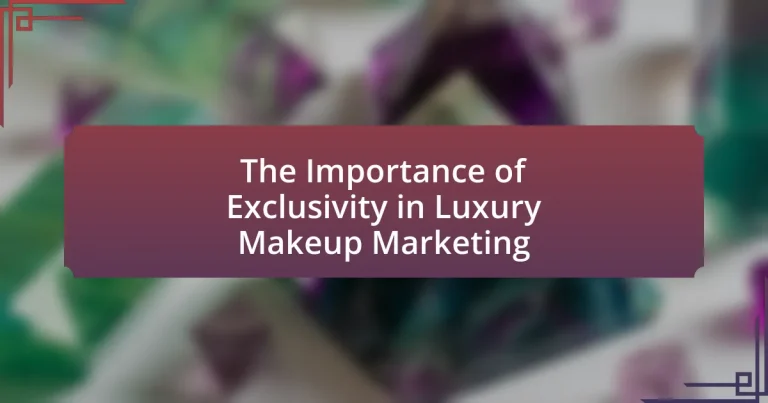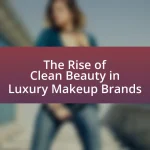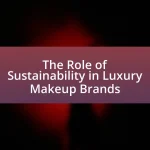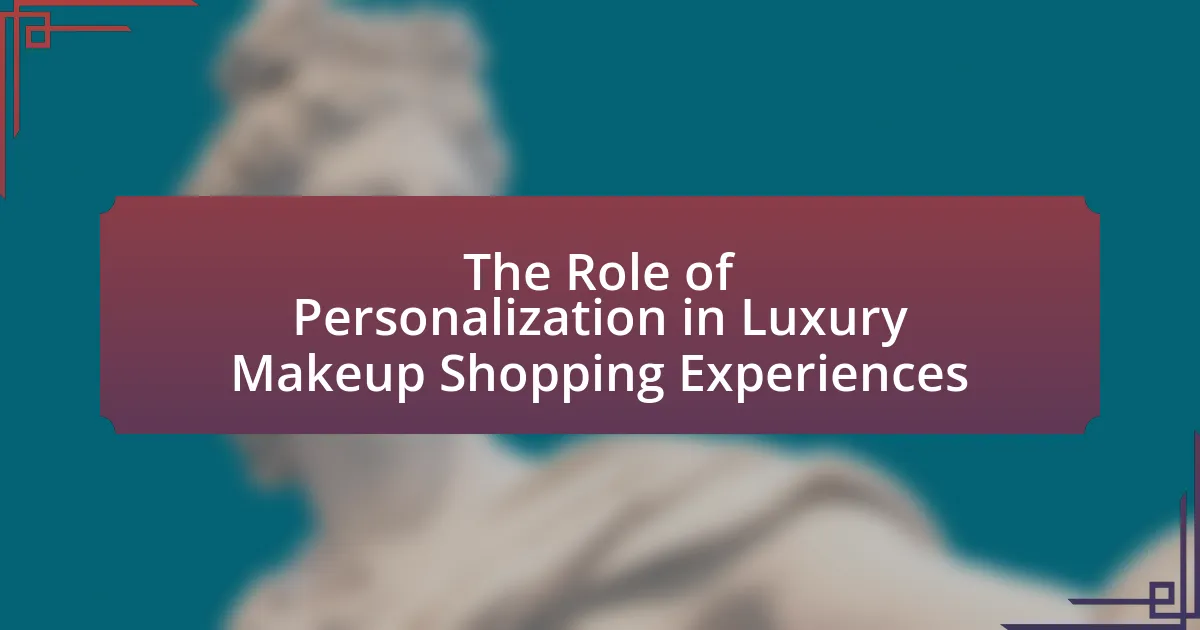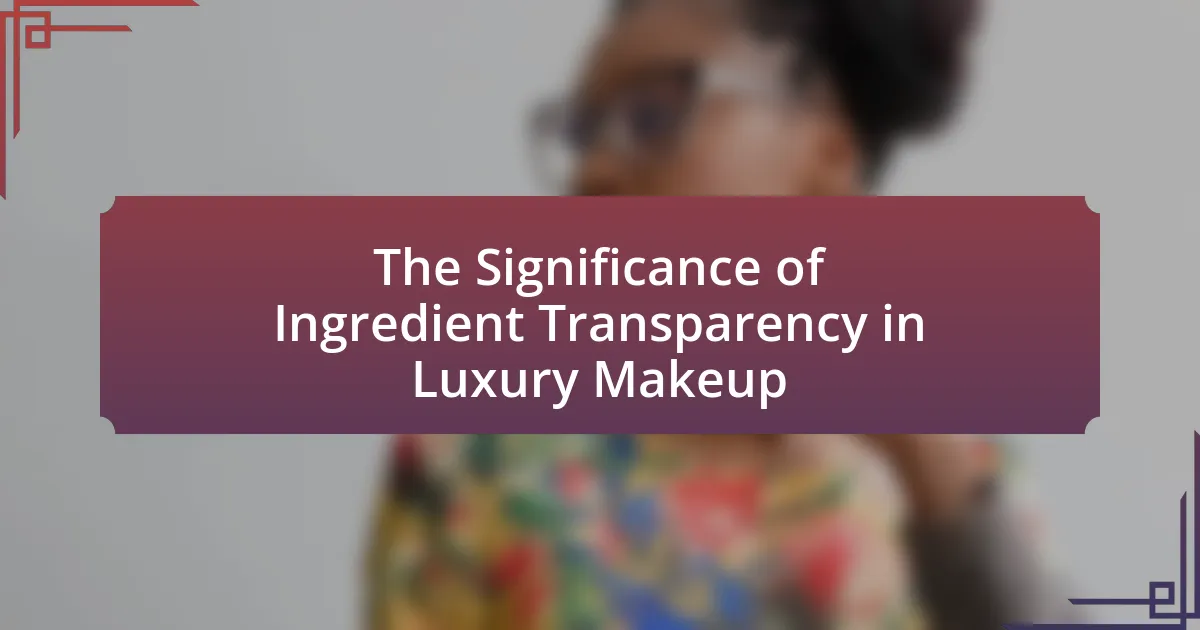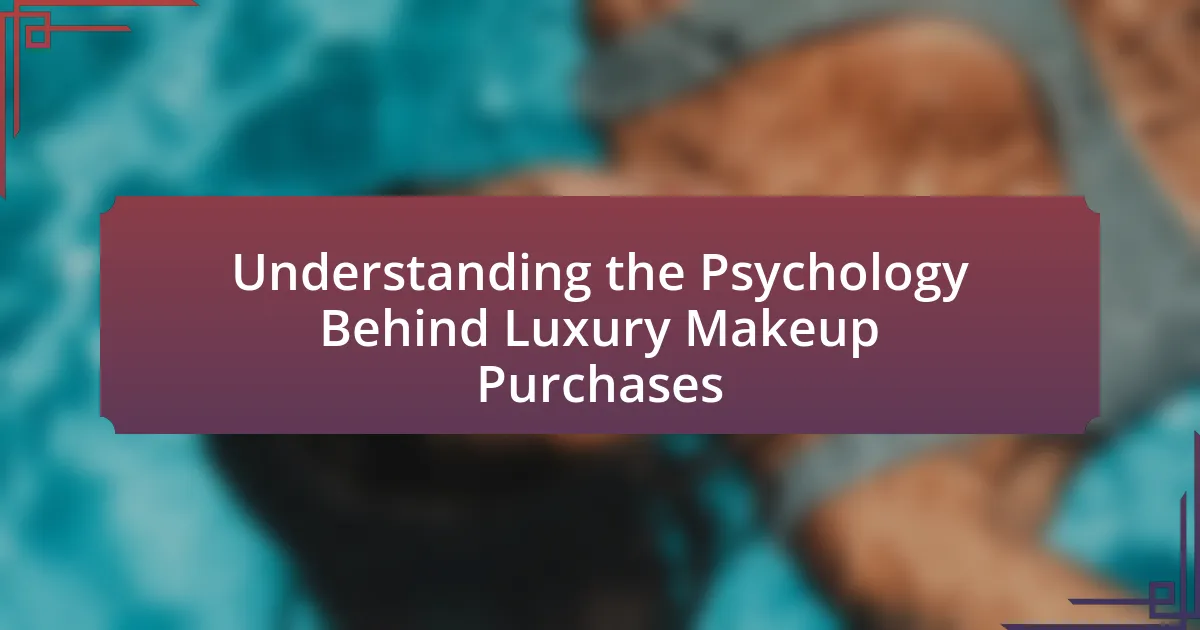The article focuses on the significance of exclusivity in luxury makeup marketing, emphasizing how limited product availability enhances brand prestige and consumer desirability. It explores the psychological effects of exclusivity on consumer behavior, highlighting how perceived rarity drives demand and fosters brand loyalty. The discussion includes strategies employed by luxury brands, such as limited-edition releases and selective distribution, to maintain their elite status while also addressing potential risks associated with overexposure and perceived inauthenticity. Additionally, the article examines emerging trends and best practices for luxury makeup brands to effectively leverage exclusivity in response to changing consumer preferences.
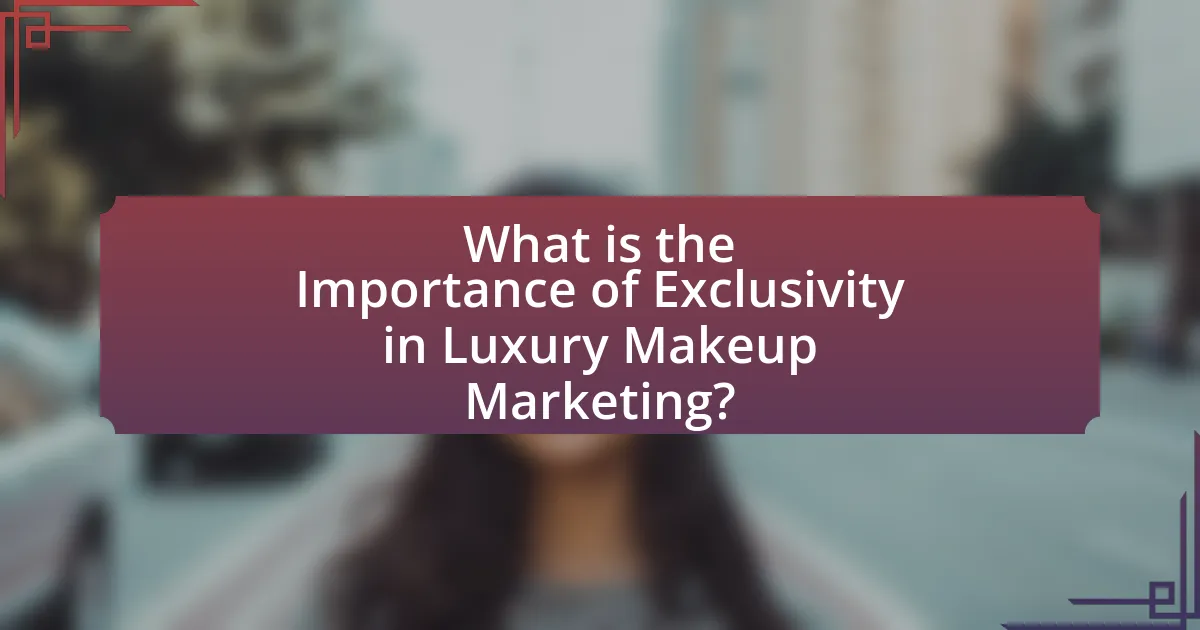
What is the Importance of Exclusivity in Luxury Makeup Marketing?
Exclusivity in luxury makeup marketing is crucial as it enhances brand prestige and consumer desirability. By limiting product availability, brands create a sense of rarity that appeals to affluent consumers who seek unique and high-status items. This strategy is supported by research indicating that luxury brands that maintain exclusivity often experience higher demand and consumer loyalty, as seen in the case of brands like Chanel and Dior, which have successfully leveraged limited edition releases to boost sales and brand image.
Why is exclusivity a key factor in luxury makeup branding?
Exclusivity is a key factor in luxury makeup branding because it creates a perception of rarity and desirability among consumers. This perception drives demand, as limited availability often leads to higher perceived value. For instance, brands like Chanel and Tom Ford frequently release limited-edition products, which not only enhances their allure but also fosters a sense of urgency among consumers to purchase before items sell out. Research indicates that luxury brands that maintain exclusivity can command higher prices and cultivate stronger brand loyalty, as consumers associate exclusivity with prestige and status.
What psychological effects does exclusivity have on consumers?
Exclusivity creates a sense of desirability and enhances perceived value among consumers. When products are marketed as exclusive, they trigger psychological responses such as increased status and self-esteem, as consumers associate ownership with social prestige. Research indicates that limited availability can lead to heightened demand, as seen in a study by Cialdini (2009), which highlights the principle of scarcity in consumer behavior. This principle suggests that consumers perceive exclusive items as more valuable due to their limited nature, leading to a stronger emotional connection and willingness to pay a premium price.
How does exclusivity differentiate luxury brands from mass-market products?
Exclusivity differentiates luxury brands from mass-market products by creating a perception of rarity and prestige that enhances desirability. Luxury brands often limit production, offer unique designs, and employ selective distribution channels, which fosters a sense of uniqueness among consumers. For instance, brands like Chanel and Louis Vuitton frequently release limited-edition items, making them more sought after. This strategy is supported by research indicating that consumers are willing to pay a premium for products perceived as exclusive, as evidenced by a study published in the Journal of Consumer Research, which found that exclusivity can significantly increase a product’s perceived value and consumer interest.
How does exclusivity influence consumer perception of luxury makeup?
Exclusivity significantly enhances consumer perception of luxury makeup by creating a sense of rarity and desirability. When luxury makeup brands limit availability or offer exclusive products, they foster an image of prestige and sophistication, which appeals to consumers seeking status and uniqueness. Research indicates that consumers often associate limited-edition products with higher quality and value, leading to increased willingness to pay premium prices. For instance, a study published in the Journal of Consumer Research found that consumers perceive exclusive products as more desirable, which directly influences their purchasing decisions and brand loyalty. This perception is further reinforced by marketing strategies that emphasize scarcity, such as limited-time offers or collaborations with high-profile influencers, thereby solidifying the brand’s luxurious image in the minds of consumers.
What role does scarcity play in shaping consumer desire?
Scarcity significantly enhances consumer desire by creating a perception of exclusivity and urgency. When products are limited in availability, consumers often perceive them as more valuable, leading to increased demand. Research indicates that scarcity can trigger a fear of missing out (FOMO), compelling consumers to act quickly to secure the desired item. For instance, a study published in the Journal of Consumer Research found that limited-edition products can increase consumer interest and willingness to pay higher prices, as scarcity signals higher quality and desirability. This psychological response to scarcity is a critical factor in luxury makeup marketing, where brands often leverage limited releases to boost consumer engagement and sales.
How do luxury brands communicate exclusivity through marketing strategies?
Luxury brands communicate exclusivity through marketing strategies by employing limited product releases, high pricing, and selective distribution channels. These strategies create a perception of scarcity and desirability, which reinforces the brand’s elite status. For instance, brands like Chanel and Louis Vuitton often release limited-edition products that are available only for a short time, making them highly sought after. Additionally, luxury brands frequently utilize high price points to signal quality and exclusivity; research indicates that consumers often associate higher prices with superior quality, which enhances the brand’s prestige. Furthermore, selective distribution through exclusive retail partnerships ensures that products are only available in high-end locations, further enhancing the brand’s allure and maintaining its luxurious image.
What are the potential risks of relying on exclusivity in luxury makeup marketing?
Relying on exclusivity in luxury makeup marketing poses several potential risks, including alienation of broader consumer segments and vulnerability to market fluctuations. Exclusivity can create a perception of elitism, which may deter potential customers who feel excluded, leading to a limited customer base. Additionally, if the luxury market experiences economic downturns, brands heavily reliant on exclusivity may face significant sales declines, as consumers prioritize affordability over luxury. Historical data shows that during the 2008 financial crisis, luxury brands that depended on exclusivity saw a sharper decline in sales compared to those that offered more accessible products. This illustrates the inherent risk of a narrow market focus in volatile economic conditions.
How can overexposure affect a luxury brand’s image?
Overexposure can significantly diminish a luxury brand’s image by eroding its perceived exclusivity. When luxury brands are excessively promoted or widely available, they risk losing their allure and desirability, which are critical components of their identity. For instance, brands like Burberry experienced a decline in prestige when their products became too accessible, leading to a dilution of their luxury status. This phenomenon is supported by market research indicating that consumers associate luxury with scarcity; thus, overexposure can result in a negative perception and decreased brand value.
What happens when exclusivity is perceived as inauthentic?
When exclusivity is perceived as inauthentic, it can lead to a significant decline in brand trust and consumer loyalty. This perception undermines the value proposition that luxury brands rely on, as authenticity is a critical component of luxury marketing. For instance, a study by the Journal of Brand Management found that consumers are less likely to purchase from brands they perceive as lacking authenticity, with 60% of respondents indicating that authenticity influences their buying decisions. Consequently, brands may experience reduced sales and a tarnished reputation, as consumers gravitate towards competitors that maintain a genuine image of exclusivity.
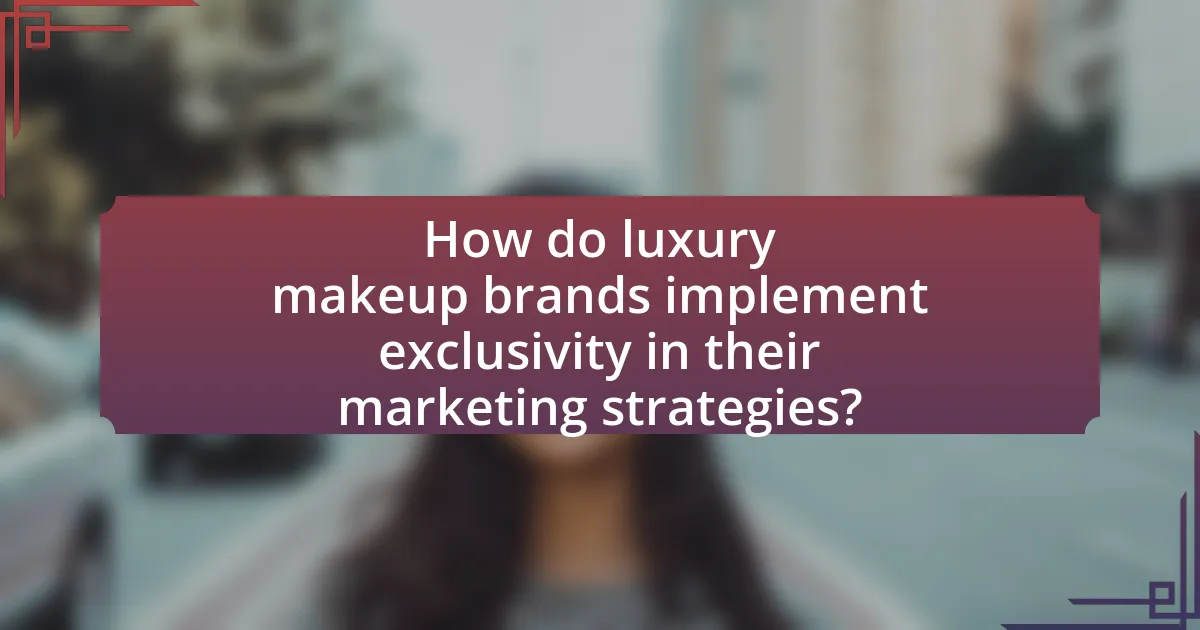
How do luxury makeup brands implement exclusivity in their marketing strategies?
Luxury makeup brands implement exclusivity in their marketing strategies by creating limited edition products, utilizing high-end packaging, and engaging in selective distribution. These brands often release products in small quantities, which generates a sense of urgency and desirability among consumers. For example, brands like Chanel and Dior frequently launch limited edition collections that are available only for a short period, reinforcing the perception of rarity.
Additionally, luxury makeup brands invest in premium packaging that enhances the overall experience and reflects the brand’s high status, further appealing to affluent consumers. Selective distribution is also a key strategy; these brands often sell their products through exclusive retailers or their own boutiques, ensuring that the shopping experience aligns with the luxury image. This approach not only maintains brand prestige but also fosters a sense of belonging among consumers who purchase these exclusive items.
What marketing tactics are commonly used to create a sense of exclusivity?
Marketing tactics commonly used to create a sense of exclusivity include limited edition products, membership programs, and personalized experiences. Limited edition products, such as seasonal makeup collections, generate urgency and desirability by restricting availability, which can lead to higher perceived value. Membership programs, like those offered by luxury brands, provide exclusive access to products, events, or promotions, fostering a sense of belonging among members. Personalized experiences, such as tailored consultations or bespoke products, enhance customer engagement and reinforce the notion of exclusivity. These tactics are effective because they leverage psychological principles of scarcity and social proof, driving consumer interest and loyalty in the luxury makeup market.
How do limited edition products enhance brand exclusivity?
Limited edition products enhance brand exclusivity by creating a perception of scarcity and uniqueness. This strategy drives consumer desire, as limited availability often leads to increased demand; for example, luxury brands like Chanel and Gucci frequently release limited edition items that sell out quickly, reinforcing their exclusive status. The psychological principle of scarcity suggests that consumers value items more when they perceive them as rare, which is evident in the luxury market where exclusivity is a key selling point.
What role do influencer partnerships play in promoting exclusivity?
Influencer partnerships play a crucial role in promoting exclusivity by leveraging the perceived authority and reach of influencers to create a sense of scarcity and desirability around luxury makeup products. When influencers showcase exclusive products or limited-edition collections, they enhance the allure of these items, making them appear more coveted and unique. For instance, a study by the Digital Marketing Institute found that 70% of millennials are influenced by the recommendations of their peers, including social media influencers, which underscores the effectiveness of influencer marketing in creating a perception of exclusivity. This strategic collaboration not only drives consumer interest but also reinforces the brand’s luxury positioning by associating it with influential figures who embody aspirational lifestyles.
How do luxury makeup brands leverage social media to convey exclusivity?
Luxury makeup brands leverage social media to convey exclusivity by curating high-quality, visually appealing content that highlights limited-edition products and exclusive events. These brands often collaborate with influencers and celebrities who embody their luxury image, creating a sense of aspiration among followers. For instance, brands like Chanel and Dior utilize platforms like Instagram to showcase behind-the-scenes access to fashion shows and exclusive product launches, reinforcing their elite status. Additionally, they employ targeted advertising strategies that reach affluent consumers, further enhancing the perception of exclusivity. This approach is supported by data indicating that 70% of luxury consumers are influenced by social media in their purchasing decisions, demonstrating the effectiveness of these strategies in maintaining a luxurious brand image.
What types of content resonate most with consumers seeking exclusivity?
Consumers seeking exclusivity resonate most with limited-edition product launches and behind-the-scenes content. Limited-edition launches create a sense of urgency and rarity, appealing to consumers’ desire for unique products. For example, luxury brands often release exclusive collections that are available for a short time, which can lead to increased demand and higher perceived value. Behind-the-scenes content, such as sneak peeks of product development or insights into the brand’s creative process, fosters a connection with consumers, making them feel part of an exclusive community. This type of content not only enhances brand loyalty but also reinforces the exclusivity associated with luxury makeup products.
How can brands use social media to create a sense of community among exclusive consumers?
Brands can use social media to create a sense of community among exclusive consumers by fostering engagement through tailored content and interactive experiences. By sharing behind-the-scenes insights, exclusive product launches, and personalized messaging, brands can make consumers feel valued and part of a select group. For instance, luxury brands like Chanel and Dior utilize platforms like Instagram to showcase limited-edition products and invite followers to exclusive events, reinforcing a sense of belonging. Research indicates that 70% of consumers feel more connected to brands that engage with them on social media, highlighting the effectiveness of these strategies in building community among exclusive consumers.
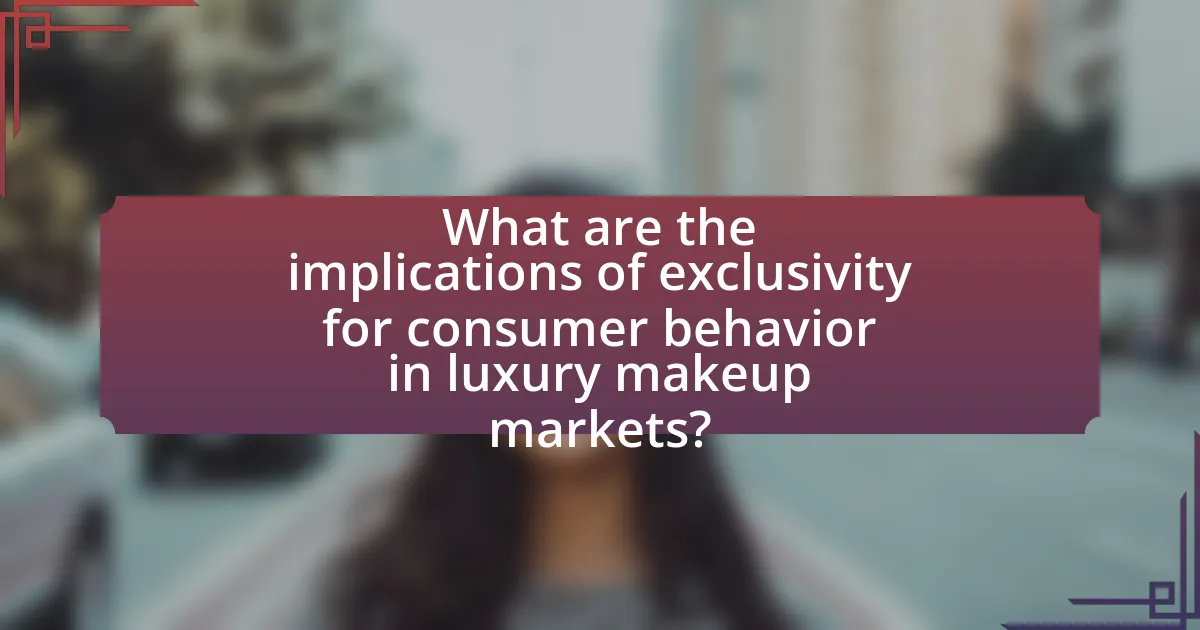
What are the implications of exclusivity for consumer behavior in luxury makeup markets?
Exclusivity significantly influences consumer behavior in luxury makeup markets by creating a perception of prestige and desirability. This perception drives consumers to seek out exclusive products, as they associate limited availability with higher quality and status. Research indicates that luxury brands often employ scarcity tactics, such as limited edition releases, which can lead to increased consumer urgency and willingness to pay premium prices. For instance, a study published in the Journal of Consumer Research found that consumers are more likely to purchase luxury items when they perceive them as scarce, reinforcing the idea that exclusivity enhances the allure of luxury makeup products.
How does exclusivity affect purchasing decisions among consumers?
Exclusivity significantly influences purchasing decisions among consumers by creating a perception of scarcity and desirability. When products are marketed as exclusive, consumers often associate them with higher status and quality, leading to a greater willingness to purchase. Research indicates that 70% of consumers are more likely to buy a product if they perceive it as exclusive, as exclusivity enhances the perceived value and uniqueness of the item. This phenomenon is particularly evident in luxury makeup marketing, where brands leverage limited editions and exclusive releases to drive demand and foster brand loyalty.
What motivates consumers to seek out exclusive luxury makeup products?
Consumers are motivated to seek out exclusive luxury makeup products primarily due to the desire for status and uniqueness. This motivation stems from the perception that luxury products signify wealth and social standing, which is supported by research indicating that 70% of luxury consumers believe exclusivity enhances their social image. Additionally, the allure of limited availability creates a sense of urgency and desirability, as evidenced by the fact that brands often release products in small quantities, driving demand and enhancing perceived value. This combination of status enhancement and scarcity effectively compels consumers to pursue exclusive luxury makeup items.
How does exclusivity influence brand loyalty in the luxury makeup sector?
Exclusivity significantly enhances brand loyalty in the luxury makeup sector by creating a perception of rarity and prestige among consumers. This perception drives customers to feel a stronger emotional connection to the brand, as they associate ownership with status and uniqueness. Research indicates that luxury brands that limit product availability or offer exclusive collections see higher customer retention rates; for instance, a study by the Journal of Brand Management found that 70% of luxury consumers are more likely to remain loyal to brands that provide exclusive products. This exclusivity not only fosters a sense of belonging but also encourages repeat purchases, as consumers are motivated to maintain their status within a select group of brand loyalists.
What trends are emerging in the luxury makeup market regarding exclusivity?
Emerging trends in the luxury makeup market regarding exclusivity include limited-edition product releases, personalized offerings, and collaborations with high-profile influencers. Limited-edition releases create a sense of urgency and desirability, as brands like Chanel and Dior frequently launch exclusive collections that are available for a short time, driving consumer demand. Personalized offerings, such as bespoke makeup services or customizable products, enhance the exclusivity experience, allowing consumers to feel unique and valued. Collaborations with influencers or celebrities, such as Rihanna’s Fenty Beauty, further amplify exclusivity by leveraging their personal brand and reach, making products feel more coveted. These trends reflect a strategic focus on creating unique consumer experiences that reinforce brand prestige and loyalty.
How are brands adapting exclusivity strategies in response to changing consumer preferences?
Brands are adapting exclusivity strategies by leveraging limited-edition product releases and personalized customer experiences to align with evolving consumer preferences for uniqueness and authenticity. For instance, luxury makeup brands like Chanel and Dior frequently launch exclusive collections that are available for a short time, creating a sense of urgency and desirability among consumers. Additionally, brands are increasingly utilizing data analytics to understand consumer behavior, allowing them to tailor offerings and marketing messages that resonate with individual preferences. This shift is supported by a report from McKinsey, which indicates that 70% of consumers are more likely to purchase from brands that offer personalized experiences.
What future challenges might luxury makeup brands face in maintaining exclusivity?
Luxury makeup brands may face significant challenges in maintaining exclusivity due to the increasing accessibility of luxury products through online platforms and social media. As e-commerce continues to grow, brands risk diluting their exclusive image by reaching a broader audience, which can lead to overexposure and a loss of desirability. Additionally, the rise of fast fashion and affordable beauty brands that mimic luxury aesthetics further complicates exclusivity, as consumers may opt for cheaper alternatives that provide similar experiences. According to a report by McKinsey & Company, the luxury beauty market is projected to grow, but this growth may come at the cost of exclusivity as brands expand their distribution channels to capture a larger market share.
What best practices can luxury makeup brands adopt to effectively utilize exclusivity?
Luxury makeup brands can effectively utilize exclusivity by implementing limited edition product releases, creating exclusive membership programs, and collaborating with high-profile influencers. Limited edition releases generate urgency and desirability, as seen with brands like Chanel, which often sells out quickly due to their scarcity. Exclusive membership programs, such as those offered by brands like Sephora, provide loyal customers with early access to new products and special events, enhancing brand loyalty. Collaborations with high-profile influencers, like Rihanna’s partnership with Fenty Beauty, create buzz and elevate brand status, attracting a more affluent customer base. These practices not only reinforce the brand’s luxury image but also drive sales through perceived value and exclusivity.
